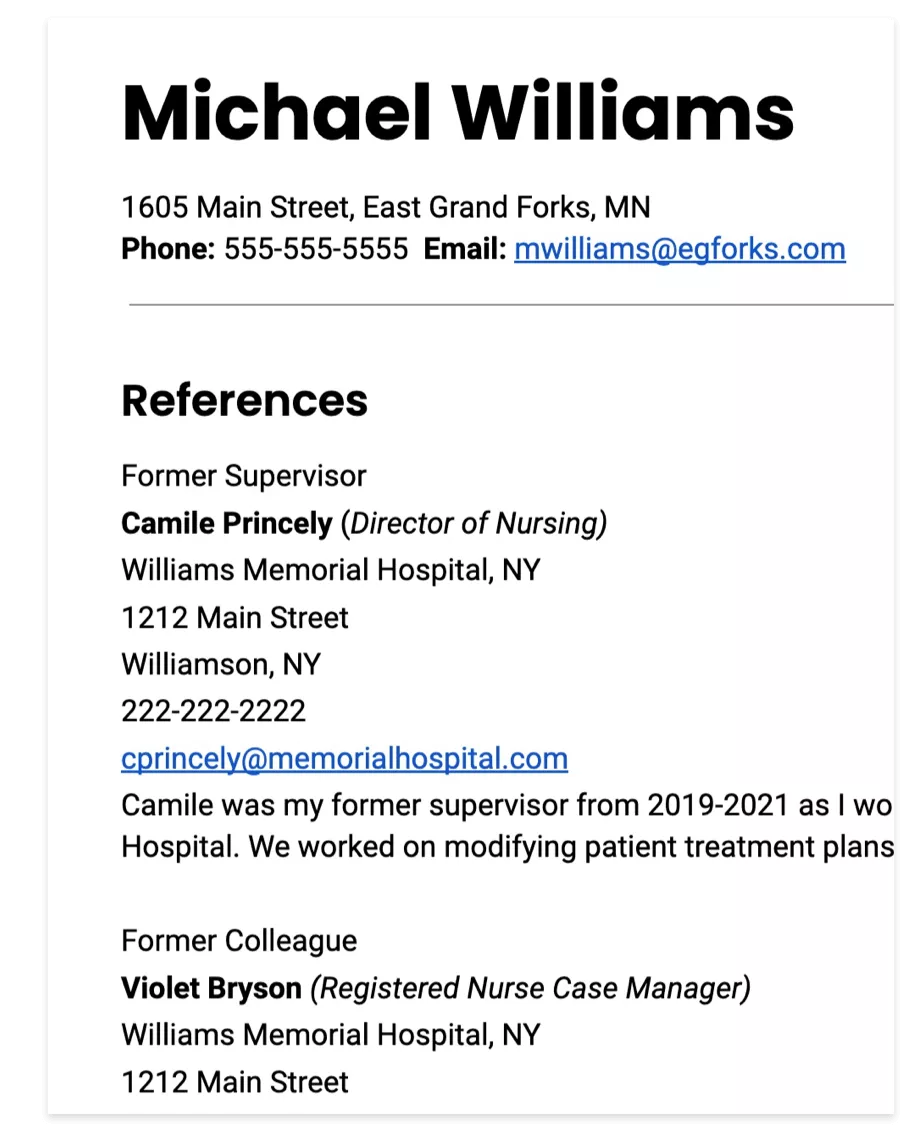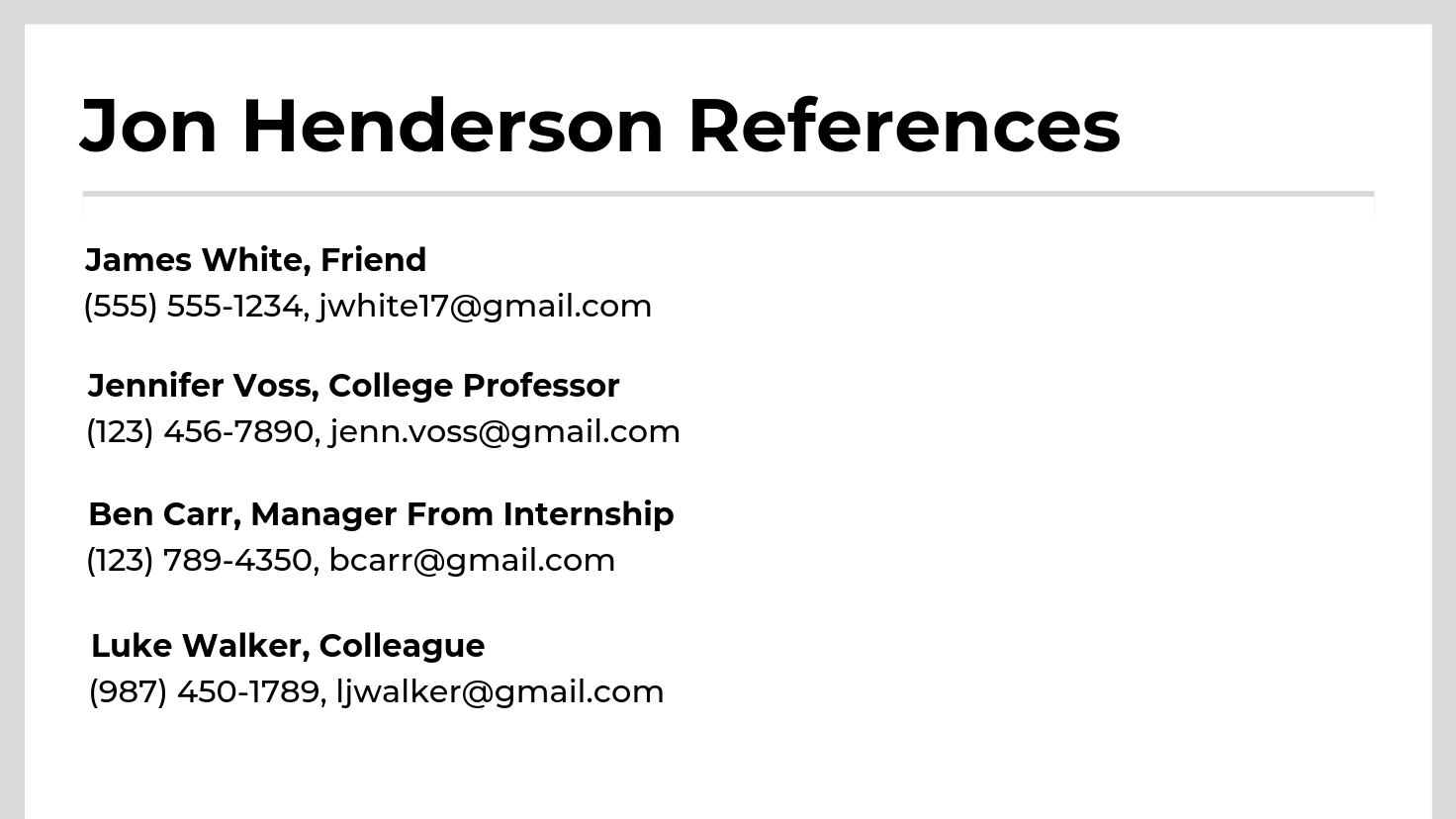Fine Beautiful Info About Do You Put References On CV Or Resume

References on Your CV or Resume
1. Should You Include References on Your Resume?
Let's dive right into it, shall we? The age-old question: Do you actually need to put references directly on your CV or resume these days? The short answer is usually, "Nope, not anymore!" Think of your resume as prime real estate. You want to use that space to showcase your amazing skills, impressive accomplishments, and tantalizing work history. Listing references can often feel like giving away valuable square footage that could be used to sell yourself better.
In the past, it was pretty standard practice. Employers expected to see a "References Available Upon Request" line at the bottom. Now? It's almost assumed that you have references ready to go if they're needed. So, it's generally safe to leave them off unless the job posting specifically asks for them. Imagine going to a fancy dinner and automatically putting salt on your food before tasting it. Not a great move, right? Same principle here. Wait to be asked!
Consider this: instead of listing names and contact information directly on your resume, you can use that space to expand on your responsibilities at your previous jobs, quantify your achievements, or even add a bullet point or two about a particularly impressive project. That's going to be way more impactful to a hiring manager than a list of names they might not even contact until much later in the process. It's about maximizing your presentation.
Think about the modern recruiter: they are often dealing with hundreds of resumes for each position, so the less clutter, the better! They are looking for candidates who can quickly demonstrate their value. Focus on what makes you shine and keep the references in your back pocket for when they are requested. You want your resume to be a highlight reel, not an encyclopedia.

When to Include References (The Exceptions to the Rule)
2. When are References Appropriate to Include?
Okay, so I said don't usually include them. But, like with most things in life, there are exceptions. Sometimes, explicitly including your references is not only acceptable but advantageous. We are talking about situations when the job description specifically requests references. If the application instructions say "Please include three professional references," well, then you better include three professional references! Ignoring those instructions is a surefire way to get your resume tossed into the "no" pile.
Another exception might be if you are in a specific industry or country where including references is still the norm. For example, some academic positions or government jobs might still expect to see references on your CV. It's always a good idea to do a little research on industry standards for your particular field before submitting your application. Ask your colleagues, mentors, or career advisor what the accepted practices are.
Also, consider if you have a particularly strong reference who is well-known and respected in the industry. For example, if you were working directly under a celebrity chef and they are happy to vouch for you, including that information can add significant credibility to your application (but always ask them first!). Think of it as name-dropping, but in a professional and appropriate way. A reference from a thought leader in your field might be a strong selling point.
Finally, if you are asked to provide references as part of an online application form, and there is no other place to upload a separate document, then you will obviously have to list them directly on the form or possibly in your resume. Sometimes systems are just...well...systems! Read the instructions carefully and comply to the best of your ability. No need to be a hero; just follow the guidelines.

Preparing Your References
3. What to Do Before Listing a Reference.
Whether you include your references directly on your resume or keep them ready for later, it's absolutely essential to prepare them beforehand. Never, ever, ever list someone as a reference without their explicit permission. It's not only rude, but it could also backfire spectacularly if they're caught off guard and don't provide a glowing recommendation. Imagine the awkwardness!
Once you've obtained permission, provide your references with some context. Tell them about the specific job you're applying for, highlight the key skills and qualifications the employer is seeking, and remind them of the specific projects or accomplishments you worked on together. The more information they have, the better equipped they'll be to sing your praises effectively. Give them the details so they can tailor their answers to the job you are applying for.
Also, make it easy for the hiring manager to contact your references. Provide them with accurate contact information, including their full name, title, company, phone number, and email address. Double-check that the information is correct before submitting your application. A misspelled email address or a wrong phone number can delay the process and make you look unprofessional. Little things count!
Finally, send your references a thank-you note (email is fine!) after they've spoken with the hiring manager. It's a small gesture that shows your appreciation for their time and effort. Building and maintaining strong relationships with your references can pay off in the long run, as they can continue to be valuable resources throughout your career. Remember to be grateful — your references are doing you a huge favor!

Writing References On A Resume Guide With Examples CakeResume
Crafting the Perfect "References Available Upon Request" Statement
4. How to Phrase the "References Available" Statement
So, you've decided to leave your references off your resume, but you still want to signal to the employer that you have them ready and waiting. The classic "References Available Upon Request" is perfectly acceptable, but feel free to get a little creative! A simple statement will do the trick, just to show that you are prepared when they ask.
Instead of using the standard phrase, you could try something like "Professional references available upon request" or "References available upon request; please inquire." It's a subtle difference, but it adds a touch of professionalism. If you are applying for an academic role, you can state "Academic and professional references available upon request".
Another option is to simply omit the statement altogether. As I mentioned earlier, it's often assumed that you have references ready to go if the employer asks for them. However, if you are concerned about appearing unprepared, including a brief statement is perfectly fine. It's a matter of personal preference and what you feel most comfortable with.
Regardless of which statement you choose, make sure it's placed in a consistent and professional manner. Typically, it goes at the bottom of your resume, centered or aligned to the left or right. Choose a font size and style that matches the rest of your resume. You want it to look polished and professional, not like an afterthought. Keep it simple and clear!
![How To List References On A Resume [Reference Page Format] How To List References On A Resume [Reference Page Format]](https://cdn-images.zety.com/pages/references_on_a_resume_template_vibes.png)
Leveraging LinkedIn for References and Recommendations
5. Using LinkedIn for References
In today's digital age, LinkedIn has become an invaluable tool for building your professional network and showcasing your skills and experience. It's also a great place to gather and display recommendations from colleagues, managers, and clients. Think of it as a digital reference list that's readily available to anyone who views your profile.
Actively solicit recommendations from people you've worked with in the past. Reach out to former managers, colleagues, or clients and ask them to write a brief recommendation highlighting your skills, work ethic, and contributions to the team. Be specific in your request, and provide them with some context about the types of roles you're currently pursuing. The more information you give them, the better the recommendation will be.
Don't just passively wait for recommendations to come in. Take the initiative and write recommendations for others as well. It's a great way to build relationships and reciprocate the favor. Plus, it shows that you're a supportive and collaborative team player, which is always a plus in the eyes of potential employers. Build a good rapport.
Finally, make sure your LinkedIn profile is up-to-date and reflects your current skills and experience. Include a professional headshot, a compelling summary, and a detailed description of your previous roles. The more complete and engaging your profile is, the more likely you are to attract the attention of recruiters and hiring managers. LinkedIn is your digital storefront; make sure it looks appealing!

FAQs About References on Your CV or Resume
6. Your Reference Questions Answered
Still have some lingering questions about references on your resume? Let's tackle some of the most frequently asked questions:
Q: How many references should I have ready?A: Aim for at least three professional references. These should be people who can speak to your skills, work ethic, and accomplishments. Former managers, supervisors, and colleagues are all good options.
Q: What if I don't have a lot of work experience?A: If you're just starting out in your career, consider using academic references, such as professors or instructors who can vouch for your abilities. You can also use references from volunteer work, internships, or extracurricular activities.
Q: Can I use a personal reference?A: Generally, it's best to stick to professional references. However, if you're applying for a job where character and integrity are particularly important, a personal reference from someone who knows you well might be acceptable.
Q: What if a reference is no longer at the company where I worked with them?A: That's perfectly fine! As long as they can still speak to your skills and experience, their current employment status doesn't matter. Just be sure to provide their current contact information.
Q: What do I do if a former employer won't give me a good reference?A: This can be tricky. If possible, try to avoid using references from employers who you know won't give you a positive recommendation. Focus on references who you're confident will sing your praises. If you must list that employer, try to find a specific person at that company (e.g., a former colleague) who you know will give you a good reference. In some cases, it may be worth addressing the situation directly with the hiring manager, but proceed with caution and be prepared to explain the situation professionally and diplomatically.